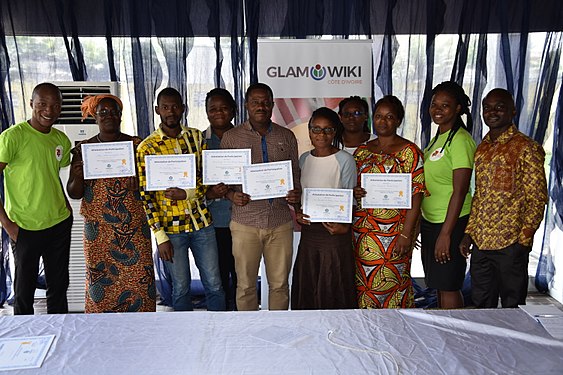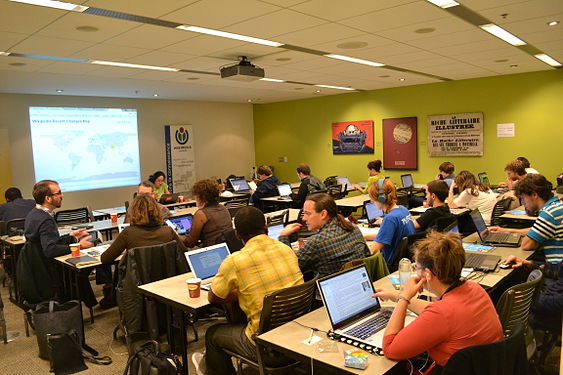Learning patterns/How to survive to an international edit-a-thon when you're the only coordinator
What problem does this solve?[edit]
The International Month of Francophone Contribution is a series of workshops around the French-speaking world that has been in existence since 2013 and is coordinated by one person, myself. Here are the challenges I face every year: attracting volunteers, connecting volunteers from the same region, encouraging them to get organized, and finding a place large enough to welcome participants and guests, help them find a place to stay. little funding, and when everything is ready on February 28th ... we kicked off!
What is the solution?[edit]
Although the preparation of each of the workshops is unique and at the discretion of the local Wikimedian, the international coordination is quite a puzzle! The first step is to start preparations as soon as possible: a call for participation on the event's discussion page, and an invitation banner (CentralNotice) targeting users connected to Wikimedia's French-language projects.
Next, you need to follow each discussion closely to encourage and encourage local Wikimedan groups to get organized, which is no small task! Building and maintaining a map of the workshops under discussion and those confirmed is a tool that should not be overlooked; the contribution to Wikipedia is a "solitary sport" and if a Wikipedian wants to join his local group, searching on a map is easier than looking in an excessively cumbersome discussion page.
A good practice is to have a FramaForm form filled in by the organizers; this prevents organizers from constantly having to go fishing for information: date (s), start & end time, computers available, contact person, name of place, address, geographical coordinates, etc. Many local organizers forget to mention this basic information, which causes a lot of work for the international organization. Not to mention that in many countries there is no street name or civic number on the buildings. It is not uncommon to read something like, "Join us on the 2nd floor of the 3rd building to the left of the pharmacy."
Announce on Facebook, Twitter and other social media is good. But offering a graphic service so that local groups can create a poster and communication in their area is even better. Thus, a vector document (in SVG format) made available in Wikimedia Commons for everyone to adapt, allows for a consistent image and communication around the globe.
Dashboard of Programs and Events[edit]
It is interesting to be able to quantify contributions throughout the month of the contribution, but even more interesting for international organizers, is to see the "retention rate" of newly trained contributors in all these workshops.
There is a tool developed by Wiki Education Foundation called the Dashboard of Programs and Events that offers a variety of modules to handle a host of aspects ranging from participant registration, tracking of their contributions, management of thematic articles, etc. An indispensable tool that will be exploited by the international team as of the next edition of the international month of the francophone contribution.
Results in pictures[edit]
-
Edit-a-thon social entrepreneurship at ESCP Europe, organized by Wikimedia France, the NOISE and Change the World in 2h.
-
Bamako, Mali
-
Oran, Algeria: poster announcing the contribution workshop in the heart of Oran.
-
Paris, France
-
Abidjan, Ivory Coast
-
Montréal, Canada
-
Kisangani, Democratic Republic of the Congo
-
Sidi Bouzid, Tunisia









